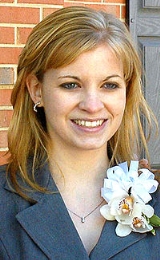
(PFC) in the United States Army
Quartermaster Corps. Lynch served in Iraq
during the 2003 invasion
by U.S. and allied forces. On March 23, 2003 she was injured and captured by Iraqi forces but was recovered on April 1 by U.S. Special Operations Forces, with the incident subsequently receiving considerable news coverage. Lynch's was the first successful rescue of an American POW since World War II and the first ever of a woman.
Initial media reports on Lynch's recovery in Iraq were incorrect.
I lived the war in Iraq, and today I still have family and friends fighting in Iraq. My support for our troops is unwavering. I believe this is not a time for finger-pointing, it is a time for truth — the whole truth— vs. hype, and misinformation.
![]()
I was given opportunities not extended to my fellow soldiers, I embraced those opportunities to set the record straight.
![]()
I had a story tell, a story that needed to be told so that people would know the truth.
![]()
The nurses at the hospital tried to soothe me, and they even tried unsuccessfully at one point to return me to Americans.
![]()
A group came to the hospital to rescue me. I could hear them speaking in English but I was still very afraid. Then a soldier came into the room. He tore the American flag from his uniform and he handed it to me in my hand. And he told me "We're American soldiers, and we're here to take you home." And I looked at him and I said "Yes, I am an American soldier too."
![]()
When I remember those difficult days, I remember the fear, I remember the strength, I remember that hand of that fellow American soldier, reassuring me that I was going to be okay.
![]()
Tales of great heroism were being told... at my parents home in Wirt County, West Virginia, it was understaged by media all repeating the story of the "little girl Rambo" from rural West Virginia who went down fighting. It was not true.
![]()
I have repeatedly said, when asked, that if the stories about me helped inspired our troops and rally a nation, then perhaps there was some good. However, I am still confused as to why they chose to lie and try to make me a legend, when the real heroics — of my fellow soldiers that day — were legendary.
![]()
The bottom line is the American people are capable of determining their own heroes — ideals for heroes — and they don't need to be told elaborate lies.
![]()

